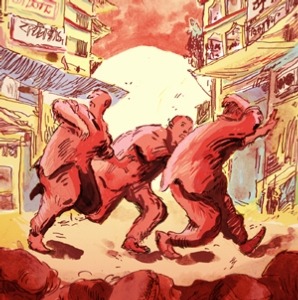After years of struggling to establish an alternative to the God myths, the rationalist communities are now about to inherit the future. Ludovic Kennedy, in his recent book All in the Mind, also adds as a sub-title 'A Farewell to God'. That is precisely the situation we are now in. Organised religions are still well bedded down, but their underlying convictions cannot last long into the twenty-first century. The centenary of the Rationalist Press Association is a good time to review where the future will take us. Point one is that civilisation is now not only faced with the need to become global but also cosmic. Space exploration will be the great adventure of the twenty-first century. More elaborate space probes are already in process of production. The evidence is likely to build up that our beautiful-but vulnerable-little Earth is not the only source of life in the Cosmos.
'But', ask those who cling to past assumptions, 'will it be intelligent life'? The answer to that is 'Almost certainly on the evidence facing us'. Our Earth has clearly demonstrated the incredible potentiality of bio-diversity to shape life along the path of ever-greater complexity. As the Encyclopaedia Britannica tells us, along with many other reliable sources, our star, the Sun, is in no way special. As there are millions of stars in the Cosmos it is rather absurd to suppose that none of them has generated planets of a size and temperature suitable for the evolution of intelligent life. We humans represent the development on this planet of cosmic creativity. Creativity, we now know, blossoms slowly from the bottom up; it is not due to an injection from divine sources. As we are ourselves creative beings, our responsibility for the future of life is inescapable. So in what ways have the rationalist communities to change to match the challenge of that responsibility? It is not possible to go into details in a short comment, but we can get some perspective on what is involved by pointing to one or two issues.
Because of its particular role in uncovering truth, rationalism has tended to value particularly the intellectual dimensions of knowing, and to undervalue the emotional element in existence. This imbalance now needs correcting. There can be no thought without feeling and no feeling without an element of thought. Science is not just due to the intellect. The driving force of intellectual activity is the desire to know. The realisation of the positive interactions of educated thought and feeling has brought the social influence upon human evolution into the forefront of attention. Minds thrive on interaction. We humans are social creatures, stimulating discussions and sharing each others ideas.
The brings us, with rather a jump, to the need of societies for festivals and ceremonies to hold them together and generate a sense of significance. What is rationalism to do about that? When Christianity replaced paganism, church leaders, very wisely, reshaped pagan festivals on a Christian basis. What needs to happen now is the transformation of Christian festivals into humanistic patterns. Christmas, for example, should become a festival of love and caring, which indeed, is much where it is now, since religious absorptions are nothing like as strong as they once were. Easter could well be converted into a celebration of Life itself, in all its wonder an variety. We are intelligent beings in charge of a planet that needs our caring, and we are ourselves longing for affection and self-fulfilment. We can rejoice together about that. A third festival, perhaps in the autumn, could be a festival of youth when society celebrates the advance into adulthood of all the young people who have reached the age of sixteen in the preceding year. This could include developing a guilt-free but responsible attitude towards attaining sexual maturity.
We see, then, that rationalism can be proud of its achievement in carrying humanity beyond the ancient myths. But big tasks lie ahead. These can only be achieved by the co-operation of those who care for the planet, one another, and the future. That, surely, is what the morality of contemporary rationalism is about.

